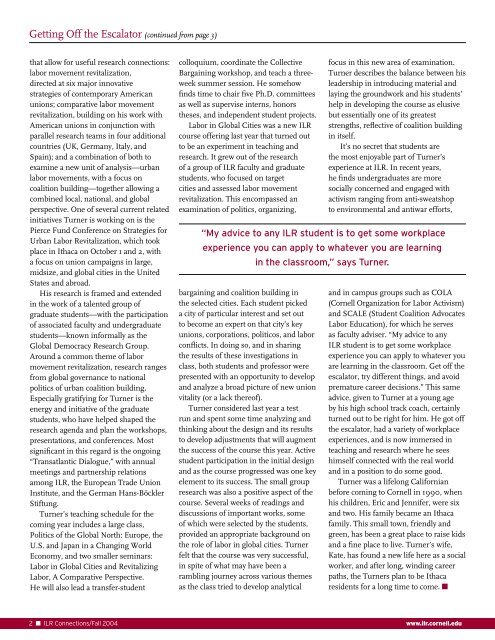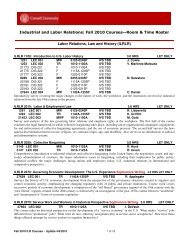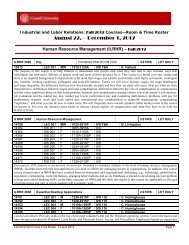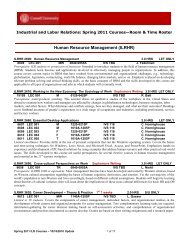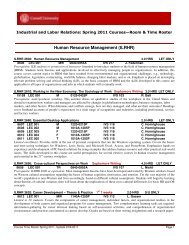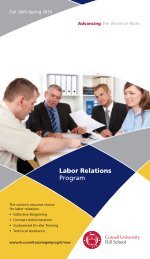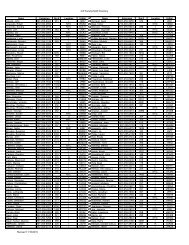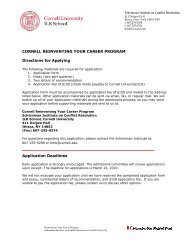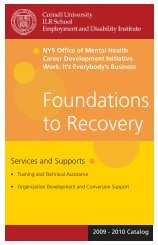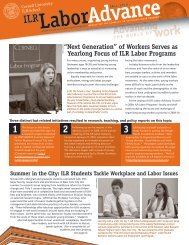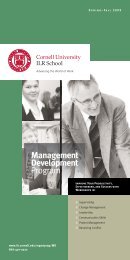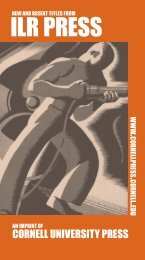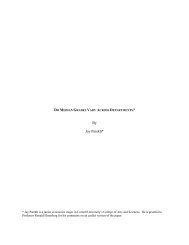F-ILR Connections newsletter revised final mechs.indd - ILR School ...
F-ILR Connections newsletter revised final mechs.indd - ILR School ...
F-ILR Connections newsletter revised final mechs.indd - ILR School ...
Create successful ePaper yourself
Turn your PDF publications into a flip-book with our unique Google optimized e-Paper software.
Getting Off the Escalator (continued from page 3)<br />
that allow for useful research connections:<br />
labor movement revitalization,<br />
directed at six major innovative<br />
strategies of contemporary American<br />
unions; comparative labor movement<br />
revitalization, building on his work with<br />
American unions in conjunction with<br />
parallel research teams in four additional<br />
countries (UK, Germany, Italy, and<br />
Spain); and a combination of both to<br />
examine a new unit of analysis—urban<br />
labor movements, with a focus on<br />
coalition building—together allowing a<br />
combined local, national, and global<br />
perspective. One of several current related<br />
initiatives Turner is working on is the<br />
Pierce Fund Conference on Strategies for<br />
Urban Labor Revitalization, which took<br />
place in Ithaca on October 1 and 2, with<br />
a focus on union campaigns in large,<br />
midsize, and global cities in the United<br />
States and abroad.<br />
His research is framed and extended<br />
in the work of a talented group of<br />
graduate students—with the participation<br />
of associated faculty and undergraduate<br />
students—known informally as the<br />
Global Democracy Research Group.<br />
Around a common theme of labor<br />
movement revitalization, research ranges<br />
from global governance to national<br />
politics of urban coalition building.<br />
Especially gratifying for Turner is the<br />
energy and initiative of the graduate<br />
students, who have helped shaped the<br />
research agenda and plan the workshops,<br />
presentations, and conferences. Most<br />
significant in this regard is the ongoing<br />
“Transatlantic Dialogue,” with annual<br />
meetings and partnership relations<br />
among <strong>ILR</strong>, the European Trade Union<br />
Institute, and the German Hans-Böckler<br />
Stiftung.<br />
Turner’s teaching schedule for the<br />
coming year includes a large class,<br />
Politics of the Global North: Europe, the<br />
U.S. and Japan in a Changing World<br />
Economy, and two smaller seminars:<br />
Labor in Global Cities and Revitalizing<br />
Labor, A Comparative Perspective.<br />
He will also lead a transfer-student<br />
colloquium, coordinate the Collective<br />
Bargaining workshop, and teach a threeweek<br />
summer session. He somehow<br />
finds time to chair five Ph.D. committees<br />
as well as supervise interns, honors<br />
theses, and independent student projects.<br />
Labor in Global Cities was a new <strong>ILR</strong><br />
course offering last year that turned out<br />
to be an experiment in teaching and<br />
research. It grew out of the research<br />
of a group of <strong>ILR</strong> faculty and graduate<br />
students, who focused on target<br />
cities and assessed labor movement<br />
revitalization. This encompassed an<br />
examination of politics, organizing,<br />
focus in this new area of examination.<br />
Turner describes the balance between his<br />
leadership in introducing material and<br />
laying the groundwork and his students’<br />
help in developing the course as elusive<br />
but essentially one of its greatest<br />
strengths, reflective of coalition building<br />
in itself.<br />
It’s no secret that students are<br />
the most enjoyable part of Turner’s<br />
experience at <strong>ILR</strong>. In recent years,<br />
he finds undergraduates are more<br />
socially concerned and engaged with<br />
activism ranging from anti-sweatshop<br />
to environmental and antiwar efforts,<br />
“My advice to any <strong>ILR</strong> student is to get some workplace<br />
experience you can apply to whatever you are learning<br />
bargaining and coalition building in<br />
the selected cities. Each student picked<br />
a city of particular interest and set out<br />
to become an expert on that city’s key<br />
unions, corporations, politicos, and labor<br />
conflicts. In doing so, and in sharing<br />
the results of these investigations in<br />
class, both students and professor were<br />
presented with an opportunity to develop<br />
and analyze a broad picture of new union<br />
vitality (or a lack thereof).<br />
Turner considered last year a test<br />
run and spent some time analyzing and<br />
thinking about the design and its results<br />
to develop adjustments that will augment<br />
the success of the course this year. Active<br />
student participation in the initial design<br />
and as the course progressed was one key<br />
element to its success. The small group<br />
research was also a positive aspect of the<br />
course. Several weeks of readings and<br />
discussions of important works, some<br />
of which were selected by the students,<br />
provided an appropriate background on<br />
the role of labor in global cities. Turner<br />
felt that the course was very successful,<br />
in spite of what may have been a<br />
rambling journey across various themes<br />
as the class tried to develop analytical<br />
in the classroom,” says Turner.<br />
and in campus groups such as COLA<br />
(Cornell Organization for Labor Activism)<br />
and SCALE (Student Coalition Advocates<br />
Labor Education), for which he serves<br />
as faculty adviser. “My advice to any<br />
<strong>ILR</strong> student is to get some workplace<br />
experience you can apply to whatever you<br />
are learning in the classroom. Get off the<br />
escalator, try different things, and avoid<br />
premature career decisions.” This same<br />
advice, given to Turner at a young age<br />
by his high school track coach, certainly<br />
turned out to be right for him. He got off<br />
the escalator, had a variety of workplace<br />
experiences, and is now immersed in<br />
teaching and research where he sees<br />
himself connected with the real world<br />
and in a position to do some good.<br />
Turner was a lifelong Californian<br />
before coming to Cornell in 1990, when<br />
his children, Eric and Jennifer, were six<br />
and two. His family became an Ithaca<br />
family. This small town, friendly and<br />
green, has been a great place to raise kids<br />
and a fine place to live. Turner’s wife,<br />
Kate, has found a new life here as a social<br />
worker, and after long, winding career<br />
paths, the Turners plan to be Ithaca<br />
residents for a long time to come. ■<br />
2 ■ <strong>ILR</strong> <strong>Connections</strong>/Fall 2004 www.ilr.cornell.edu


